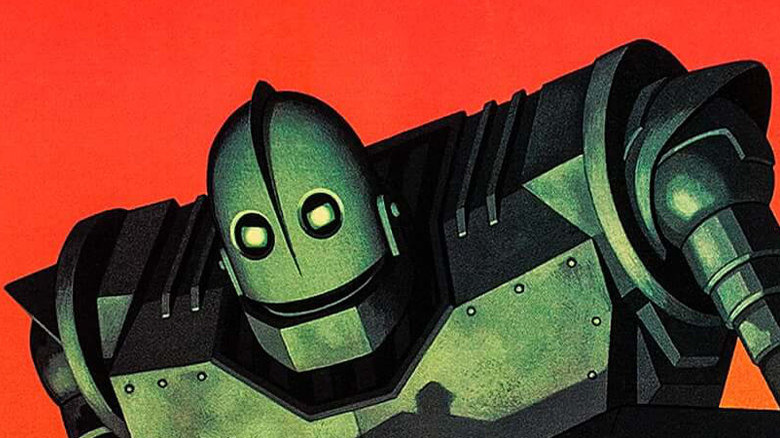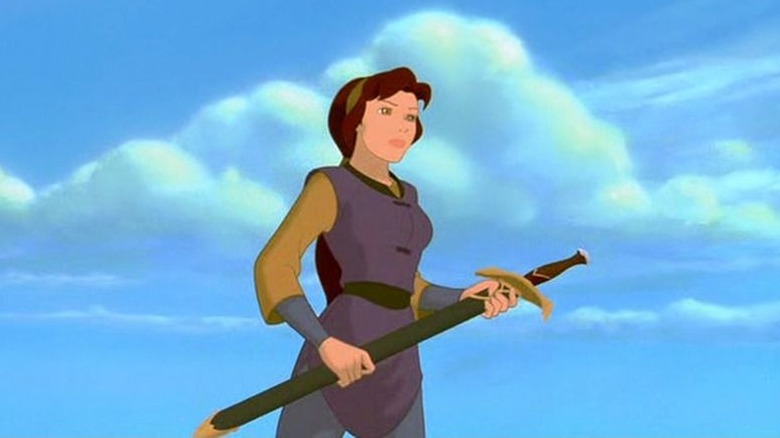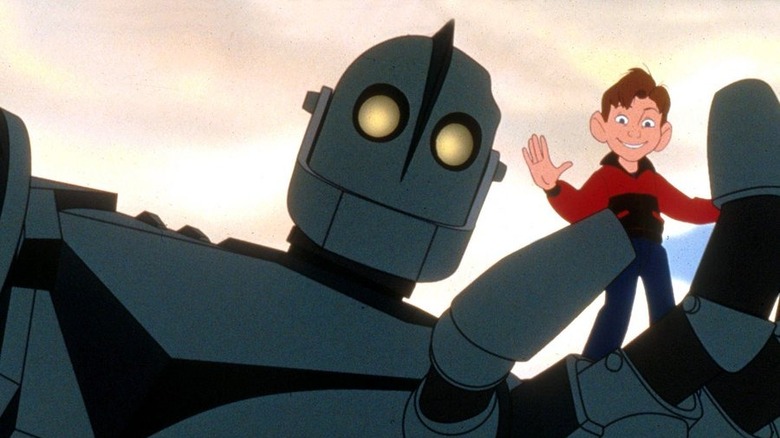The Animated Flop That Nearly Killed (And Saved) The Iron Giant
"The Iron Giant" is many things. A parable on how someone can choose their own path in life — even if that someone is a massive robot from outer space. An example of how the medium of animation can yield stories as engaging and creative as any in live-action. And a cult hit, as it found an audience of fans long after it left theaters.
Its success is also a genuine miracle, especially considering how Warner Bros. Animation was run during the time. According to writer/director Brad Bird, Warner Bros. was trying to replicate the model that rival studio Disney was using for its animated features, and finding little success:
They were trying to do a very big thing to set up an animation company from scratch. They and everyone else tries to follow the Disney model, not only in terms of the story, but also the method by which it was produced. The Disney model is sort of a micro-managed thing, where every single decision is combed over by a huge number of people. It works very well for Disney, but I don't think it worked very well for Warner Bros.
The results of Warner Bros' ambition would eventually blow up in their face due to the failure of their first major animated film, 1998's "Quest for Camelot". And its failure almost led to the torpedoing of "The Iron Giant."
Excali-burned
"Quest For Camelot" — under its original title "Quest for the Holy Grail" — was slated to become the first film under Warner Bros.' Feature Animation label. However, it was plagued with issues from the start: half of the animation team was soon reassigned to work on another WB film — a little sports drama called "Space Jam." Co-director Bill Kroyer and his wife Susan, who served as a producer, soon departed the film. Christopher Reeve, who was tapped to play King Arthur, was replaced by Pierce Brosnan.
That chaos can be seen in the final project; though the animation is lush and gorgeous, the story itself is trite and predictable — a quest to find Excalibur, a love story, a magical forest; you've seen it all before. Not helping matters are the side characters: Eric Idle and Don Rickles lack their usual comedic precision as two headed dragon Devon and Cornwall, and Jaleel White's Bladebeak can best be described as "Dollar Store Urkel" — if Urkel was a chicken with an axe for a head. The other performances range across the board, from solid (leads Jessalyn Gilsig and Cary Elwes as heroine Kaylee and blind nomad Garrett, respectively) to utterly awful (Gary Oldman overacting within an inch of his life as villain Ruber).
Gun to the head
Audiences and critics didn't react well to "Quest for Camelot"; it bombed at the box office, which ended up shelving plans for a live tour recreating the events of the film and a Nintendo 64 video game adaptation. And according to Bird, this impacted the production budget given to "The Iron Giant"; he and his team received a third of the budget that would have gone to another feature film. But this ended up working in Bird's favor — with the smaller budget and less oversight from the executives after the micromanaging tactic failed with "Quest for Camelot," he and his team were allowed more creative freedom.
They did leave us alone if we kept it in control and showed them we were producing the film responsibly and getting it done on time and doing stuff that was good. So we were definitely watched closely. But when we were delivering, they were good enough to stay away and let us make the film. That was one of the most wonderful things about this film. They truly let us make it.
What also worked in Bird's favor was the story he developed — and the fact that Warner Bros. was prepared to wipe their hands of the animation division:
If they hadn't been heading for the exits they may very well not have taken a chance on something that was not a musical, that's a strange period film, and what I pitched was "what if a gun had a soul and didn't want to be a gun?"
That gamble ended up paying off. "The Iron Giant" slowly reveals that its titular metal behemoth is a weapon of destruction programmed to retaliate if attacked — but decides to go against his original programming at the urge of Hogarth Hughes (Eli Marenthal), whom the Giant forms a bond with. To this day, I can't watch the movie without tearing up when the Giant says "I am not a gun" — and I'm thankful that "Quest for Camelot" didn't destroy its existence.


